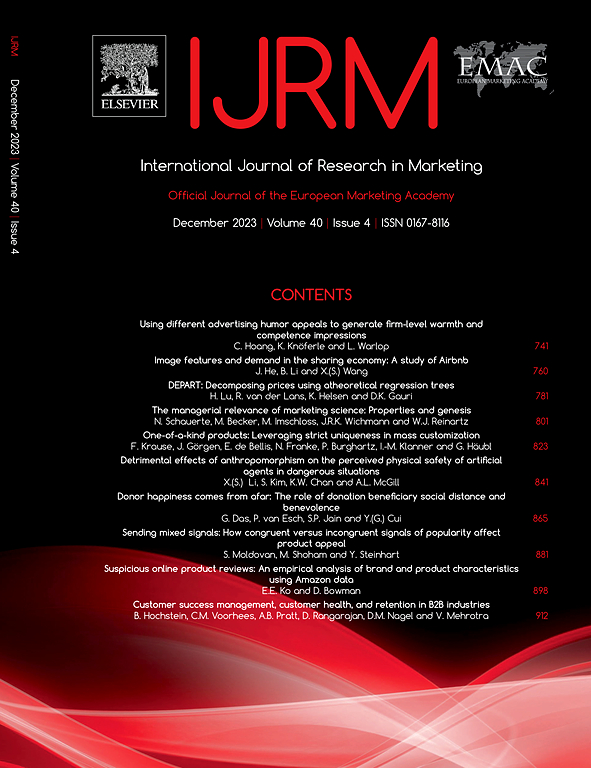如果它没有坏,你还应该修理它吗?在产品开发中纳入用户反馈对手机应用评级的影响
IF 7.5
2区 管理学
Q1 BUSINESS
International Journal of Research in Marketing
Pub Date : 2025-06-01
DOI:10.1016/j.ijresmar.2024.10.004
引用次数: 0
摘要
公司如何在评论中利用集体用户反馈来更好地定制他们的产品以提高客户满意度?本文基于对1,075,704条评论的自动文本分析和对3255个手机应用更新的内容分析,以及对460多款应用上市第一年的观察,研究了在开发连续几代手机应用的过程中,用户集体反馈对用户评分的作用。结果表明,响应用户反馈所带来的奖励和忽视用户反馈所带来的惩罚可能是巨大的。用户反馈和产品开发决策之间匹配/不匹配的影响取决于反馈的主题和更新的时间。研究结果为应用开发者提供了指导,帮助他们确定开发路径的优先顺序:(1)通过及时匹配用户反馈来提高评分,以满足用户对新内容或应用功能的需求;(2)通过不断改进现有内容或确保与最新操作系统和设备的兼容性来避免评级处罚。其含义揭示了是否以及何时对客户的声音采取行动或作出反应的基本问题。本文章由计算机程序翻译,如有差异,请以英文原文为准。
If it ain’t broke, should you still fix it? Effects of incorporating user feedback in product development on mobile application ratings
How can firms utilize collective user feedback in reviews to better tailor their products to improve customer satisfaction? Based on an automated text analysis of 1,075,704 reviews and a content analysis of 3255 mobile application updates, observed over 460 apps’ first year on the market, this paper investigates the role of collective user feedback on user ratings during the process of developing successive mobile app generations. The results reveal that the rewards associated with responding to user feedback and the penalties due to ignoring this feedback can be substantial. The impact of the match/mismatch between user feedback and product development decisions depends on the topic of the feedback and the timing of the update. The findings provide app developers with guidance on the challenge of prioritizing possible development paths: (1) improve ratings by promptly matching user feedback that require new content or smooth functioning of the app; (2) avoid rating penalties by continuously improving existing content or ensuring compatibility with most recent operating systems and devices. The implications shed light on the fundamental question of whether and when to pro-act on or re-act to the voice of the customer.
求助全文
通过发布文献求助,成功后即可免费获取论文全文。
去求助
来源期刊
CiteScore
11.80
自引率
4.30%
发文量
77
审稿时长
66 days
期刊介绍:
The International Journal of Research in Marketing is an international, double-blind peer-reviewed journal for marketing academics and practitioners. Building on a great tradition of global marketing scholarship, IJRM aims to contribute substantially to the field of marketing research by providing a high-quality medium for the dissemination of new marketing knowledge and methods. Among IJRM targeted audience are marketing scholars, practitioners (e.g., marketing research and consulting professionals) and other interested groups and individuals.

 求助内容:
求助内容: 应助结果提醒方式:
应助结果提醒方式:


